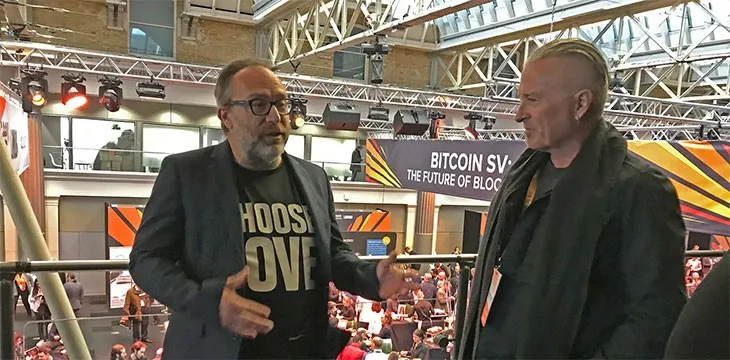|
Getting your Trinity Audio player ready...
|
Encyclopaedias once came as expensive books in many volumes – until the 1990s, when they moved to CD-ROMs, which were smaller, cheaper and included more pictures, and video.
But putting an encyclopedia online was better still, because it could be constantly updated. That was the vision of a former Chicago day trader Jimmy Wales when, in 1999, he created – Nupedia. But Nupedia’s software and its editorial processes were so complex – that he started again, with Wikipedia.
This time, anyone could contribute articles and edit them. Jimmy (above left, with CoinGeek owner Calvin Ayre) rejected the idea of supporting the business with ads, and Wikipedia.com became the not-for-profit Wikipedia.org. Today Wikipedia is far bigger than any traditional encyclopedia has ever been, with more than 52 million articles in more than 300 languages, attracting one and half billion unique visitors a month. They are also its editors, and pay for it through voluntary donations.
Jimmy Wales spoke at CoinGeek’s London conference, where he reflected on what Bitcoin SV supporters have in common with the early proponents of a free, online encyclopedia – since Wikipedia’s feasibility was just as much of a challenge to conventional wisdom as the notion of a global Bitcoin economy is today.
“I think that there’s definitely parallels and there’s differences as well. So one of the huge parallels has to do with the idea of decentralization generally,” Jimmy said. When you think of an accounting ledger, you might imagine that would involve “one big server somewhere with a big bank looking after it”. But with the design of Bitcoin, “we can do that in a completely new way, in a decentralized way, in public. That’s pretty cool. That’s pretty fascinating. And I think a lot of those kinds of vibes around decentralization are something that are held in common.”
Jimmy is adamant that blockchain would not be a good idea for Wikipedia. That’s partly because he’s sceptical that there is a demand for a micropayments technology: “the consumers don’t want it. They don’t like it. It feels funny to them. One of the great things about, say, Netflix is you pay your monthly fee, which is quite nominal, really… And there’s something nice about that it’s already paid for. And I just watch as much as I want.. A lot of Amazon services could be implemented on a micropayment level because they’ve already got our credit cards. They can sum it all up and bill us at the end of the month for our usage on Kindle or something like this… It seems to me that by and large, consumers are sceptical of that model. It doesn’t feel right to them.”

For all that, Jimmy admits to being interested in Bitcoin technology and compares what’s happening to the kind of enthusiasm he saw around the open source movement: “I think that now the energy around blockchain and a lot of the people, they are quite optimistic people and they are looking for new innovative solutions. And I mean, this is the important thing, I’m known as a critic but one of the things that’s really important here is to say, look, I find the technology fascinating. I mean, the whole idea of blockchain is just… I mean, when I first saw it and first understood, I was like, well, this is the first, like, really different idea I’ve seen in a long time. It’s super-interesting.”
If you’d like to read the transcript to this podcast, you can download it here.
Hear the whole of Jimmy Wales’ interview in this week’s CoinGeek Conversation podcast:
You can also watch the podcast video on YouTube.
Please subscribe to CoinGeek Conversations – this is the sixth episode of the podcast’s third season. If you’re new to it, there are plenty of episodes from the firstr two seasons to catch up with.
Here’s how to find them:
• Search for “CoinGeek Conversations” wherever you get your podcasts
• Subscribe on iTunes
• Listen on Spotify
• Visit the CoinGeek Conversations website
• Watch on the CoinGeek Conversations YouTube playlist

 09-04-2025
09-04-2025 





